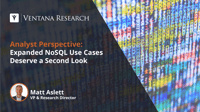The server is a key component of enterprise computing, providing the functional compute resources required to support software applications. Historically, the server was so fundamentally important that it – along with the processor, or processor core – was also a definitional unit by which software was measured, priced and sold. That changed with the advent of cloud-based service delivery and consumption models.
Read More
Topics:
Data,
Digital Technology,
Digital Business,
Data Platforms,
Analytics and Data
Over a decade ago, I coined the term NewSQL to describe the new breed of horizontally scalable, relational database products. The term was adopted by a variety of vendors that sought to combine the transactional consistency of the relational database model with elastic, cloud-native scalability. Many of the early NewSQL vendors struggled to gain traction, however, and were either acquired or ceased operations before they could make an impact in the crowded operational data platforms market....
Read More
Topics:
Business Continuity,
Cloud Computing,
Data,
Digital Technology,
Digital Business,
Data Platforms,
Analytics and Data
I recently wrote about the importance of data pipelines and the role they play in transporting data between the stages of data processing and analytics. Healthy data pipelines are necessary to ensure data is integrated and processed in the sequence required to generate business intelligence. The concept of the data pipeline is nothing new of course, but it is becoming increasingly important as organizations adapt data management processes to be more data driven.
Read More
Topics:
business intelligence,
Analytics,
Data Governance,
Data Integration,
Data,
Digital Technology,
Digital transformation,
data lakes,
data operations,
Digital Business,
Data Platforms,
Streaming Data Events,
Analytics and Data,
AI and Machine Learning
Data governance is an issue that impacts all organizations large and small, new and old, in every industry, and every region of the world. Data governance ensures that an organization’s data can be cataloged, trusted and protected, improving business processes to accelerate analytics initiatives and support compliance with regulatory requirements. Not all data governance initiatives will be driven by regulatory compliance; however, the risk of falling foul of privacy (and human rights) laws...
Read More
Topics:
Analytics,
Data Governance,
Data
I recently described the growing level of interest in data mesh which provides an organizational and cultural approach to data ownership, access and governance that facilitates distributed data processing. As I stated in my Analyst Perspective, data mesh is not a product that can be acquired or even a technical architecture that can be built. Adopting the data mesh approach is dependent on people and process change to overcome traditional reliance on centralized ownership of data and...
Read More
Topics:
Business Continuity,
business intelligence,
Analytics,
Data Governance,
Data Integration,
Data,
Digital Technology,
data lakes,
Digital Business,
Data Platforms,
Analytics and Data
Data mesh is the latest trend to grip the data and analytics sector. The term has been rapidly adopted by numerous vendors — as well as a growing number of organizations —as a means of embracing distributed data processing. Understanding and adopting data mesh remains a challenge, however. Data mesh is not a product that can be acquired, or even a technical architecture that can be built. It is an organizational and cultural approach to data ownership, access and governance. Adopting data mesh...
Read More
Topics:
business intelligence,
Analytics,
Data Governance,
Data Integration,
Data,
Digital Technology,
Digital transformation,
data lakes,
data operations,
Digital Business,
Data Platforms,
Streaming Data Events,
Analytics and Data
Despite widespread and increasing use of the cloud for data and analytics workloads, it has become clear in recent years that, for most organizations, a proportion of data-processing workloads will remain on-premises in centralized data centers or distributed-edge processing infrastructure. As we recently noted, as compute and storage are distributed across a hybrid and multi-cloud architecture, so, too, is the data it stores and relies upon. This presents challenges for organizations to...
Read More
Topics:
business intelligence,
Analytics,
Data Governance,
Data,
data operations,
Data Platforms,
AI and Machine Learning
I recently examined how evolving functionality had fueled the adoption of NoSQL databases, recommending that organizations evaluate NoSQL databases when assessing options for data transformation and modernization efforts. This recommendation was based on the breadth and depth of functionality offered by NoSQL database providers today, which has expanded the range of use cases for which NoSQL databases are potentially viable. There remain a significant number of organizations that have not...
Read More
Topics:
NoSQL,
Data,
Data Platforms,
Use Cases
The various NoSQL databases have become a staple of the data platforms landscape since the term entered the IT industry lexicon in 2009 to describe a new generation of non-relational databases. While NoSQL began as a ragtag collection of loosely affiliated, open-source database projects, several commercial NoSQL database providers are now established as credible alternatives to the various relational database providers, while all the major cloud providers and relational database giants now also...
Read More
Topics:
Analytics,
Data,
Data Platforms,
AI and Machine Learning




















